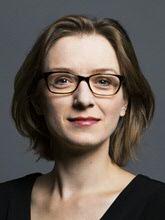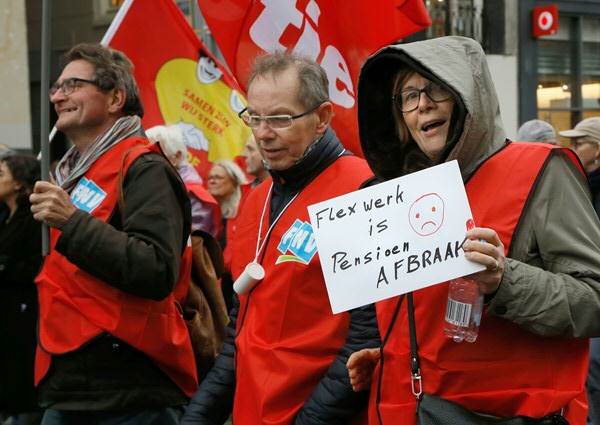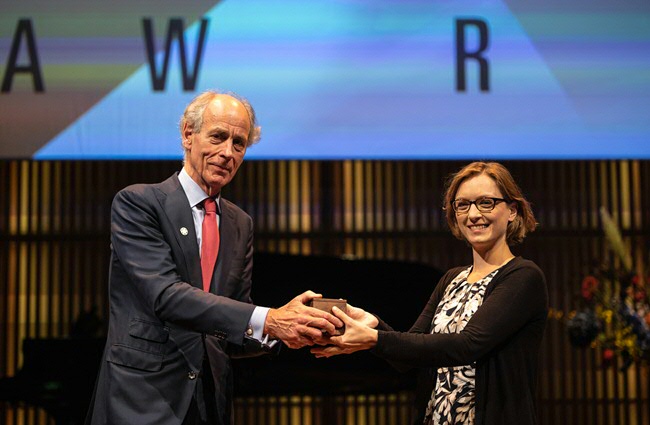Blowing holes in economic ideologies
Earlier this year, political philosopher and associate professor of the UG, Lisa Herzog, was awarded the Ammodo Science Award, which she will be presented with on Tuesday. In concrete terms, this translates into a sum of €300,000 for the purposes of fundamental research. So, what will this ambitious philosopher do now? Well, among other things, she will hire a postdoc to take over part of her teaching, so she can finally sink her teeth into a new research project.
Hopefully, she will be able to start in 2022, she says elatedly from behind her screen in her home in Germany. Lisa Herzog embodies the saying that the economy is too important to be left to economists. As a philosopher, she has spent a considerable amount of time thinking critically about the current economic structures. ‘I myself have also studied economics, because I didn’t just want to see things from a philosophical perspective, but from a realist perspective as well. I discovered that the economy is full of models that are practically ideologies, because the underlying assumptions are not tenable. So, I contribute to the more activist side of my work by blowing holes in the economic assumptions that people have. In an ideal world, this would have been done from within the economic field itself, but a lot of mainstream thought has nestled itself there in methodologies. A lot of criticism on economic thinking comes from the fields of sociology, psychology, geography and philosophy. That is the academic environment I find myself in.’

Manifesto
The word ‘activist’ was dropped, which is not unjustified. Last year in May, in the middle of the coronavirus pandemic, Herzog and seven other international humanities researchers published a manifesto on the democratization of the workplace in 43 daily and weekly publications. The manifesto was co-signed by internationally celebrated economists such as Dani Rodrik, Thomas Piketty and Ha-Joon Chang, as well as the German-American philosopher Susan Neiman. The pandemic had clearly shown which professions and sectors were of great importance to society, such as health care and food supply. But in the eyes of Lisa Herzog and her colleagues, the capitalist free market fails to provide the professions we truly need with the right amount of prestige and reward. According to her, that has to change. That is why the manifesto contends that labour should no longer be seen as a product and that health care, for example, should be ‘unmarketed’. It also argues for the democratization of the workplace. Works councils have too little power. From now on, employees should have a hand in deciding which CEO steers the ship, how profit should be distributed and which direction a company should go in.
Democratization of the workplace
The democratization of the workplace is unsurprisingly also the focus of the political-philosophical research that Herzog wants to start on in earnest in 2022. ‘In truth, it’s an empirical puzzle why there aren’t more cooperatives, why owners and employees aren’t essentially the same group who together decide how the company is run. Countless philosophers, starting at least with John Stuart Mill in the nineteenth century, thought that cooperation would be the model of the future. That is a more democratic and liberal way of working than if you have capital on the one hand and labour on the other, with all the conflicts that entails. I would like to expand the thinking on democratic workplaces by also looking at possible models from non-Western societies and researching attempts from the past. Starting at the end of the eighteenth century and through the nineteenth century, many attempts were made to organize work differently,’ she says. ‘This stagnated afterwards. In the West, we clung to corporations and other business models. Economists have long assumed that this is because these business models are the most efficient ones. But when you look at it from a more political-economic perspective, with an eye towards power relations, it becomes clear that employees have not always had the chance to organize their own structures. The conversation on this topic is still ongoing. The cooperatives that exist now are rather efficient and have survived for a rather long time.’

Many uncertain jobs
But why the rush to think about this? ‘If you look at countries like the Netherlands or Germany, it’s easy to think: it’s not so bad, we have strong unions, we are safe. But that is only a half-truth,’ Herzog replies. ‘There are many uncertain jobs at the moment. Many jobs aren’t even really jobs, because people are formally subcontractors for online platforms. There is some empirical evidence that suggests that if people don’t have any say in their own job, if they don’t have the opportunity to change anything or speak their mind, that there is a correlation with their broader democratic mindset. That is why when we speak of a crisis of democracy, we also have to look at how our economic systems have changed. And that we have to be conscious that people don’t really feel that they have a grip on their own life and that they have become dependent on uncertain work. My suspicion is that this is fertile ground for a possible populist who says: I shall protect our country from those international companies, like Trump did. My idea is that there is a connection between the way in which our political system is run and how our economic system is put together. If a lot of people experience our economic system as unfair and unequal, then that forms a risk to our democracy.’
Pros and cons
‘The topic of “work” is making a big comeback in philosophy,’ says Herzog. Based on last year’s manifesto, she has become involved in an international conference that is planned for October. ‘It’s intrinsic to my being as a Political Philosopher to think about topics that are connected to values and viewpoints. I wouldn’t bring my activism into the lecture hall. During lectures, I have to present a variety of viewpoints, show pros and cons and never try to convert anybody. Simultaneously, I think that it is important that researchers take a position in the public debate and speak their mind about this.’
CV
Lisa Herzog (1983) has been Professor of Political Philosophy at the UG since 2019. This German philosopher studied economics, philosophy and political theory in Munich and Oxford and worked at the Universities of St. Gallen, Frankfurt, Stanford and the TU Munich. Her most recent English-language book Reclaiming the System (2018) was published by Oxford University Press. In this book, she looked at the organizational machinery of modern companies and the place that wage labour inhabits. She described how more control for the employee could be the basis of a more just corporate structure, that might better anticipate the great challenges of our time, such as the struggle with climate change.
- Text: Jurgen Tiekstra. This article has been taken from our alumni magazine Broerstraat 5.
- Video portrait Lisa Herzog

| Last modified: | 15 September 2021 11.45 a.m. |
More news
-
05 March 2025
Women in Science
The UG celebrates International Women’s Day with a special photo series: Women in Science.
-
07 January 2025
UG students dive into the European music industry
Next week, the annual Eurosonic Noorderslag music festival (ESNS) will kick off again. Two groups of students from the UG Science Shops will participate in the event. During the ESNS festival, they will investigate various societal themes.
